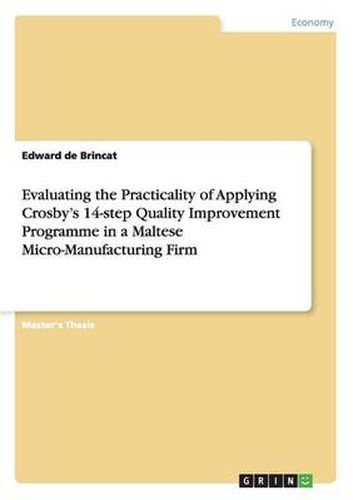Readings Newsletter
Become a Readings Member to make your shopping experience even easier.
Sign in or sign up for free!
You’re not far away from qualifying for FREE standard shipping within Australia
You’ve qualified for FREE standard shipping within Australia
The cart is loading…






Master’s Thesis from the year 2012 in the subject Business economics - Business Management, Corporate Governance, grade: 80, University of Leicester, course: Master of Business Management - Quality Management, language: English, abstract: Executive Summary Manufacturing companies including a local micro-enterprise - Quality Postform Ltd are persistently facing competitive pressures as a consequence of customers demanding higher quality products. The emergence of Quality Management has been attributed by many researchers and Quality Gurus including Phil Crosby as a strategic imperative for typical organisations to survive within a highly competitive environment. Nevertheless, research carried out throughout the past years is relatively restricted regarding the practicality of micro-manufacturing firms in implementing Crosby’s Quality Improvement Programme, which is claimed to be highly beneficial in typical situations. This dissertation seeks to investigate this scenario from both a descriptive and critical perspective towards Quality Postform Ltd. The research provides a critical evaluation of the academic contributions towards the quality management concept. Distinct disputed viewpoints have been identified focusing on Crosby’s 14-Step Quality Improvement Programme. From one end of the spectrum, supporters uphold that claimed benefits have been acknowledged. Alternatively, others sustain that in essence a Quality Improvement Programme is counter-productive in terms of its application within Small and Medium sized Enterprises. However the researcher has identified four key pre-requisites in order for micro-firms to effectively implement Crosby’s programme. These include: management commitment, the acknowledgement of a quality problem, the organisation’s readiness to embrace change together with the suppliers’ readiness to support the quality programme. The methodology applied to assess the presence of these four pre-requisites at QPL was to compile primar
$9.00 standard shipping within Australia
FREE standard shipping within Australia for orders over $100.00
Express & International shipping calculated at checkout
Master’s Thesis from the year 2012 in the subject Business economics - Business Management, Corporate Governance, grade: 80, University of Leicester, course: Master of Business Management - Quality Management, language: English, abstract: Executive Summary Manufacturing companies including a local micro-enterprise - Quality Postform Ltd are persistently facing competitive pressures as a consequence of customers demanding higher quality products. The emergence of Quality Management has been attributed by many researchers and Quality Gurus including Phil Crosby as a strategic imperative for typical organisations to survive within a highly competitive environment. Nevertheless, research carried out throughout the past years is relatively restricted regarding the practicality of micro-manufacturing firms in implementing Crosby’s Quality Improvement Programme, which is claimed to be highly beneficial in typical situations. This dissertation seeks to investigate this scenario from both a descriptive and critical perspective towards Quality Postform Ltd. The research provides a critical evaluation of the academic contributions towards the quality management concept. Distinct disputed viewpoints have been identified focusing on Crosby’s 14-Step Quality Improvement Programme. From one end of the spectrum, supporters uphold that claimed benefits have been acknowledged. Alternatively, others sustain that in essence a Quality Improvement Programme is counter-productive in terms of its application within Small and Medium sized Enterprises. However the researcher has identified four key pre-requisites in order for micro-firms to effectively implement Crosby’s programme. These include: management commitment, the acknowledgement of a quality problem, the organisation’s readiness to embrace change together with the suppliers’ readiness to support the quality programme. The methodology applied to assess the presence of these four pre-requisites at QPL was to compile primar